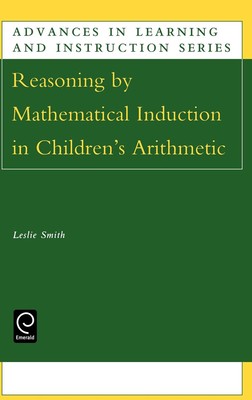
- We will send in 10–14 business days.
- Publisher: Pergamon
- ISBN-10: 0080441289
- ISBN-13: 9780080441283
- Format: 15.6 x 23.4 x 1.3 cm, kieti viršeliai
- Language: English
- SAVE -10% with code: EXTRA
Reasoning by Mathematical Induction in Children's Arithmetic (e-book) (used book) | bookbook.eu
Reviews
Description
How do children understand reasoning by mathematical induction? Mathematical induction - Poincare's reasoning by recurrence - is a standard form of inference with two distinctive properties. One is its necessity. The other is its universality or inference from particular to general. This means that mathematical induction is similar to both logical deduction and empirical induction, and yet is different from both. In a major study 40 years ago, Inhelder and Piaget set out two conclusions about the development of this type of reasoning in advance of logical deduction during childhood. This developmental sequence has gone unremarked in research on cognitive development. This study is an adaptation with a sample of 100 hundred children aged five-seven years in school years one and two. It reveals evidence that children can reason by mathematical induction on tasks based on iterative addition and that their inferences were made by necessity. According to the study the main educational implication is clear: young children can carry out iterative actions on actual objects with a view to reasoning about abstract objects such as numbers.
EXTRA 10 % discount with code: EXTRA
The promotion ends in 21d.22:09:56
The discount code is valid when purchasing from 10 €. Discounts do not stack.
- Publisher: Pergamon
- ISBN-10: 0080441289
- ISBN-13: 9780080441283
- Format: 15.6 x 23.4 x 1.3 cm, kieti viršeliai
- Language: English English
How do children understand reasoning by mathematical induction? Mathematical induction - Poincare's reasoning by recurrence - is a standard form of inference with two distinctive properties. One is its necessity. The other is its universality or inference from particular to general. This means that mathematical induction is similar to both logical deduction and empirical induction, and yet is different from both. In a major study 40 years ago, Inhelder and Piaget set out two conclusions about the development of this type of reasoning in advance of logical deduction during childhood. This developmental sequence has gone unremarked in research on cognitive development. This study is an adaptation with a sample of 100 hundred children aged five-seven years in school years one and two. It reveals evidence that children can reason by mathematical induction on tasks based on iterative addition and that their inferences were made by necessity. According to the study the main educational implication is clear: young children can carry out iterative actions on actual objects with a view to reasoning about abstract objects such as numbers.


Reviews